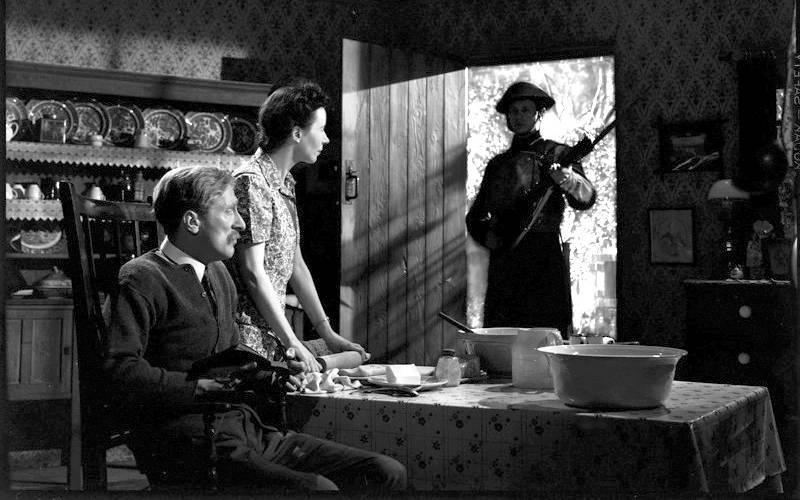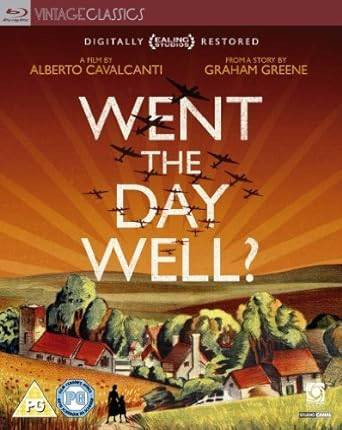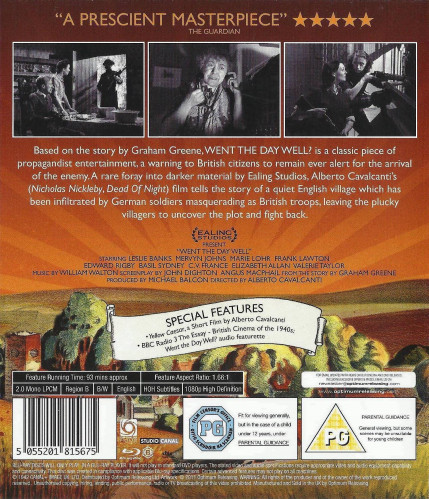WENT THE DAY WELL? [Digitally Restored – 80 Years of Ealing] [Blu-ray] [1942 / 2011] [UK Release] Classic Prescient Masterpiece based on a short story by Graham Greene.
WENT THE DAY WELL? is one of the most unusual pictures Ealing Studios produced, a distinctly unsentimental war film made in the darkest days of World War II, and nothing like the loveable comedies that later became the Ealing trademark.
Based on the story by Grahame Greene, Went The Day Well? is a classic piece of propagandist entertainment, a warning to British citizens to remain ever alert for the arrival of the enemy. Alberto Cavalcanti’s film tells the story of a quiet English village which has been infiltrated by German Soldiers masquerading as British Troops, leaving the plucky villages to uncover the plot and fight back.
Its clear-eyed view of the potential for violence lurking just below the surface in a quiet English village possibly owes something to the Graham Greene story on which it is based, though, as Penelope Houston shows, there remains a mystery about the extent to which Graham Greene was actually involved in the scripting. Or perhaps the direction by the Brazilian born Alberto Cavalcanti, a maverick within the Ealing coterie, is the chief reason why ‘WENT THE DAY WELL?’ avoids the cosy feel of later, more familiar, Ealing films.
FILM FACT: ‘WENT THE DAY WELL?’ was produced by Michael Balcon of Ealing Studios and served as unofficial propaganda for the war effort. The film shows a Southern English village taken over by German paratroopers, reflecting the greatest potential nightmare for the British public of the time, although the threat of German invasion had largely receded by that point. The film is notable for its unusually frank, for the time, depiction of ruthless violence. The film was based on a short story by the author Graham Greene entitled “The Lieutenant Died Last.” The film's title is based on an epitaph written by the classical scholar John Maxwell Edmonds. It originally appeared in The Times on the 6th February, 1918 entitled “Four Epitaphs.” “Went the day well” also appeared in an unidentified newspaper cutting in a scrapbook now held in the RAF Museum (AC97/127/50), and in a collection of First World War poems collated by Vivien Noakes. This was the first significant role of actress Thora Hird's career, and one of the last for the actor C. V. France.
The film reinforced the message that civilians should be vigilant against fifth columnists and that "careless talk costs lives". By the time the film was released the threat of invasion had subsided somewhat but it was still seen as an effective piece of propaganda and its reputation has grown over the years. It has been noted that by opening and closing in a predicted future where not only had the war been won but a (fictitious) full-scale German invasion of Britain defeated and by presenting a scenario where all echelons of British society unite for the common good (the lady of the manor sacrifices herself without hesitation, for example), the film's message was morale-boosting and positive rather than scaremongering. Anthony Quinn, a film critic for The Independent on Sunday, commented in 2010, “It subtly captures an immemorial quality of English rural life — the church, the local gossip, the sense of community—and that streak of native 'pluck' that people believed would see off Hitler.”
The title is taken from a World War One poem by John Maxwell Edmonds, shown at the opening of the film and says: Went the day well? We died and never knew. But, well or ill, Freedom, we died for you. Went the day well? When you go home, tell them of us and say, “For your tomorrows, these gave their todays.” “When You Go Home, Tell Them Of Us And Say, For Their Tomorrow, We Gave Our Today.”
Cast: Leslie Banks, C.V. France, Valerie Taylor, Marie Lohr, Harry Fowler, Norman Pierce, Frank Lawton, Elizabeth Allan, Thora Hird, Muriel George, Patricia Hayes, Mervyn Johns, Hilda Bayley, Edward Rigby, Johnnie Schofield, Ellis Irving, Philippa Hiatt, Grace Arnold, Basil Sydney, David Farrar, John Slater, Eric Micklewood, Irene Arnold (uncredited), Kathleen Boutall (uncredited), Robert Bradford (uncredited), Dean Braine (uncredited), James Donald (uncredited), Lillian Ellias (uncredited), Leslie Gorman (uncredited), Gerard Heinz (uncredited), Christopher Lee (uncredited), Robert McDermott (BBC Announcer) (uncredited), Josephine Middleton (uncredited), Wyndham Milligan (uncredited), Gerald Moore (uncredited), Charles Paton (uncredited), Anthony Pilbeam (uncredited), Arthur Ridley (uncredited), Janette Scott (uncredited), Norman Shelley (uncredited), Tommy Trinder (Dance Band Announcer on Radio) (uncredited), Robert Brooks Turner (uncredited), Mavis Villiers (uncredited), Jack Vyvyan (uncredited), Josie Welford (uncredited) and H Victor Weske (uncredited)
Director: Alberto Cavalcanti
Producers: Michael Balcon and S.C. Balcon
Screenplay: Angus MacPhail (story and screenplay), Diana Morgan (story and screenplay), Graham Greene (story) and John Dighton (story and screenplay)
Composer: William Walton
Special Effects: Roy Kellino
Visual Effects: Matthew Baker (digital restoration artist) (uncredited)
Cinematography: Wilkie Cooper, B.S.C. (Director of Photography)
Image Resolution: 1080p (Black and White)
Aspect Ratio: 1.37:1
Audio: English: 2.0 LPCM Stereo Audio
Subtitles: English
Running Time: 93 minutes
Region: Region B/2
Number of discs: 1
Studio: United Artists / Ealing Studios / British Film Institute / OPTIMUM Releasing / Studio Canal
Andrew’s Blu-ray Review: ‘WENT THE DAY WELL?’ [1942] the story is set in the fictional English village of Bramley End, and the viewer is introduced to several of the villagers. Charlie Sims [Mervyn Johns] is the caretaker of the parish church; “13th Century, parts of it” he says. Nora Ashton [Valerie Taylor] lives with her elderly father, the parish vicar. Nora Ashton has affections for the village squire, Oliver Wilsford [Leslie Banks], but he seems oblivious to her attentions. The post office and telephone exchange are run by Mrs. Collins [Muriel George], who also helps out at the pub; she is quite absent-minded. Jim Sturry [Norman Pierce] is the innkeeper; his son Tom Sturry [Frank Lawton] is home on leave from the Royal Navy for his wedding. Tom Sturry’s fiancée, Peggy Pryde [Elizabeth Allan], is a member of the Women’s Land Army; her friend Ivy Dawking [Thora Hird] is also a Land Girl. Mrs. Fraser [Marie Lohr] lives in the manor house just outside the village; she has opened her large home to a number of children who had been evacuated from London, the most precocious of whom is Young George [Harry Fowler].
Soon after the film opens, a number of Army trucks roll into Bramley End. There are two officers and 60 men; according to the officers, they are engineers who have been sent to the village to set up defensive positions in case of an enemy invasion. Most of the soldiers are billeted in the village hall, while others stay in the locals’ homes.
Twice, Young George snoops into the soldiers’ equipment and makes surprising discoveries. The first time, he is caught by a Corporal, who threatens the boy; Mrs. Collins accuses the soldier of being “no better than a German.” Nora Ashton becomes suspicious of the soldiers, but Mrs. Fraser is dismissive of her concerns. However, the commanding officer learns of Nora Ashton’s apprehensions. The commanding officer gathers the villagers and reveals that he and his men are, in fact, German paratroopers, sent ahead of a large invasion force; he warns that any attempt to escape or send warning will result in death. Several villagers defy these orders and attempt to escape, only to be cruelly suppressed by the invaders. Yet, word gets out and both the Home Guard and the regular Army come to Bramley End and fight a climactic battle at Mrs. Fraser’s manor house. Some of the villagers also take up arms; the Germans are overwhelmed and Bramley End is liberated, although not everyone survives to the end.
In actuality, Adolf Hitler intended to invade Britain in the summer of 1940, but delayed his plans when the Luftwaffe was unable to defeat the Royal Air Force and gain air superiority. Germany instead invaded Russia in 1941, and by the end of that year, the United States was involved in the war. When the film was released in 1942, there was no longer a viable threat of invasion, and one has to look beyond the obvious to find the true propaganda value of the film.
Even after the invasion scare was largely over, there was still tremendous concern over enemy espionage; the British people were warned to watch for spies, traitors, and saboteurs, and this point is certainly brought home by the film. There are clues about the true identity of the disguised Germans, but only Nora puts those clues together, despite Mrs. Fraser’s doubts.
While Bramley End is a fictional location, it is an idealized stereotype of the English village and surrounding countryside. In some respects, Bramley End could be anywhere in rural England, or even represent England as a whole. The setting helped to remind the audience of the importance of defending their homeland and way of life.
The Germans are portrayed as merciless and cruel, who think nothing of killing innocent civilians. By contrast, when the villagers rise up against the enemy, they are visibly appalled by the terrible things they must do; but they grit their teeth and get on with it. Several villagers display bravery and even self-sacrifice so that others may live in freedom. The villagers’ acts of violence are not at all graphic by today’s filmmaking standards, but the lighting and camera angles are used to heighten the drama; those sequences could almost be considered “film noir.”
The storytelling is brilliant. The introduction and conclusion take place in a future time after the war has ended and Adolf Hitler has been defeated. Most of the film is told as a flashback, but set in 1942, the year the film was released. The “bookends” set in a peaceful future were intended to reassure the audience that, inevitably, Britain would weather the storm and rise victorious. What is truly impressive is that the story has a foregone conclusion, yet manages to retain suspense. The audience knows from the beginning that the Germans will be defeated, yet it seems every attempt to send warning outside the village is doomed to failure.
There has been some criticism with some of the battle sequences somehow are hard to follow. Like the fact that the Germans retain their disguises, meaning they are uniformed and equipped identically to the British troops, making it rather difficult to tell friend from foe. From a military standpoint, it is clear this is a propaganda film and not intended for training. The cheerful Tommies win the day through dash and daring rather than superior tactics; there is a great deal of charging across open ground without the benefit of concealing smoke or supporting fire.
The screenplay was based on a story by Graham Greene; the film was directed by the famed Brazilian director, Alberto Cavalcanti. The stirring musical score was composed by William Walton; personally, I associate William Walton with his coronation marches, but he wrote several powerful film scores in the 1940’s. The cast includes Leslie Banks, Valerie Taylor, Thora Hurd, Mervyn Johns, and Basil Sydney; the credits also list the Men of the Gloucestershire Regiment. However, the real star, in my opinion, is the Buckinghamshire village of Turville, which was used for the location shots of Bramley End.
WENT THE DAY WELL? MUSIC TRACK LIST
THERE’LL ALWAYS BE AN ENGLAND (uncredited) (Written by Ross Parker and Hugh Charles [Heard on the radio after dinner at the Manor House]
CHEERY RIPE (uncredited) (Words by Robert Herrick) (Music by Charles Edward Horn) [Sung by Maude on her way to visit Mrs. Fraser]
RADIO BLUES (uncredited) (Music by William Walton) (Arranged by Ernest Irving)
Veni Creator Spiritus (uncredited) (attributed to Rabano Mauro ) (Arranged by Ernest Irving)
* * * * *
Blu-ray Image Quality – Ealing Studios, Optimum Home Entertainment and British Film Institute presents us the film ‘WENT THE DAY WELL?’ arrives on Blu-ray with a terrific and marked improvement over the previous inferior DVD release and we get to view a totally outstanding 1080p black-and-white image and of course shown in the 1.37:1 aspect ratio. Considering the film's vintage, it shows the architecture and foliage surrounding the quaint village really well. Textures in the clothing and the faces of actors are distinct and plainly visible. Interiors are also very well-defined and nicely delineated, even during poorly-lit sequences engulfed with deep, oppressive shadows. Luckily, the scan pushes superior resolution. Excellent detail provides needed texture, particularly in wide shots capturing the whole village. In close, facial definition appears, along with bricks, cobblestone, and grass. Contrast is crisp and spot-on while blacks are rich and true, providing the image with appreciable depth and dimensionality. All in all, this is a wonderful Blu-ray presentation for an unjustly forgotten war film. This is a very well done restoration and a fine complement to the high-definition picture. Please Note: ‘WENT THE DAY WELL?’ film had digital restoration by Technicolor Creative Services and PresTech Laboratories Ltd., in 2010.
Blu-ray Audio Quality – Ealing Studios, Optimum Home Entertainment and British Film Institute brings us the film ‘WENT THE DAY WELL?’ and the audio department, for the classic propaganda film arrives with a very good uncompressed 2.0 LPCM Stereo Audio track experience. Vocals are very well-prioritized and precise from beginning to end, though there are a couple negligible lines which seem a bit muddled during battle sequences. It's not really a troubling issue, however, only something worth mentioning. More apparent and of greater note is a limited and rather narrow dynamic range, which is none too surprising considering the age of the recording. The higher frequencies tend to clip and slightly distort, particularly in the explosions, and the low end is pretty much non-existent. Although the lossless mix feels a tad lacking in these minor areas, it still comes with a good sense of presence and a great deal of clarity especially with the actors.
* * * * *
Blu-ray Special Features and Extras:
Special Feature: Yellow Caesar [1941] [480i] [1.37:1] [22:30] With this featurette, we get to view a short documentary film directed by Alberto Cavalcanti. ‘Yellow Caesar’ is a 1941 propaganda film produced by Ealing Studios and Michael Balcon and directed by Alberto Cavalcanti. The screenwriters were Michael Foot, later leader of the Labour party, and Frank Owen credited under the pseudonym Michael Frank. ‘Yellow Ceaser’ is billed as a “assessment” of the life and rise to power of the self-styled Il Duce, the Italian dictator Benito Mussolini. The film traces the Italian dictator Benito Mussolini's years as a trade unionist thug and his role as a fascist demagogue. The initial idea for ‘Yellow Caesar’ appears to have come from Adrian Brunel, something of a veteran of satirical film and he was credited here for “dialogue” and “additional scenes.” The hard-hitting commentary is credited to Michael Frank, apparently a shared alias for journalists Michael Foot and Frank Owen, who as two-thirds of the pseudonymous “Cato” had written the savage anti-appeasement tract “Guilty Men” [1940]. Michael Foot would become better known as a firebrand left-wing MP, who would lead the Labour Party from 1980 to 1983. Director: Alberto Cavalcanti. Screenplay: Frank Owen (uncredited) and Michael Foot (uncredited). Commentary Writer: Michael Frank. Dialogue: Adrian Brunel. In Charge of Production: Michael Balcon. Production Manager: John Croydon. Production Company: Ealing Studios.
Special Feature: BBC Radio 3 The Essay – British Cinema of the 1940’s Episode 1: “Went the Day Well?” Audio featurette [Audio only] [2010] [1080p] [1.78:1] [14:08] With this featurette, we get to hear a short audio essay by Simon Heffer that was broadcast on 13th September, 2010, and Simon Heffer concentrates and celebrates the 1942 Ealing Studios film ‘WENT THE DAY WELL?’ and informs us that it was based on a short story by Graham Greene, depicting how a village that was invaded by Germans unites against them and eventually defeats them. Despite the bloodshed, what emerges is an almost Utopian vision of rural peace that suggests itself as a possible microcosm for a less class-bound future society. Simon Heffer re-interprets 1940’s British films in terms of their social and political message. He traces cinema's move from galvanising the public during the war to later challenging the class system. Simon Heffer gives some observations including “This is what Alberto Cavalcanti brought to the Ealing Studios, realism...” and “The ethos of Ealing Studios was a socialist one." Produced by Beaty Rubens for BBC Radio 3’s The Essay.
Finally, ‘WENT THE DAY WELL?’ [1942] is an ahead-of-its-time film if ever there was one, and is still a chilling wartime thriller even watched today. It begins deceptively genteel, with Mervyn Johns talking to the camera (a great device) and leading us into a story which at times out to be both hard hitting and very inspirational. Like the later film, ‘The Eagle Has Landed,’ this fictional film poses the “what if?” question is what if the much-mooted Nazi invasion of England had really taken place? The answer is of course limited to a single rural village in the English countryside which soon finds itself taken over by ruthless German soldiers. What follows is expertly paced and supremely directed by Alberto Cavalcanti and showing the villagers being harried, hassled and murdered and eventually fighting back against their German oppressors. It's still a violent and grim film, and including axe murders, knifings and all manner of shootings shown throughout the film, although in my mind, in particular a scene involving a hand grenade marks the most shocking moment in the film. The picture has a really excellent cast, topped by Leslie Banks as a sinister German collaborator; help makes this a really great British classic film. Very Highly Recommended!
Andrew C. Miller – Your Ultimate No.1 Film Aficionado
Le Cinema Paradiso
United Kingdom



